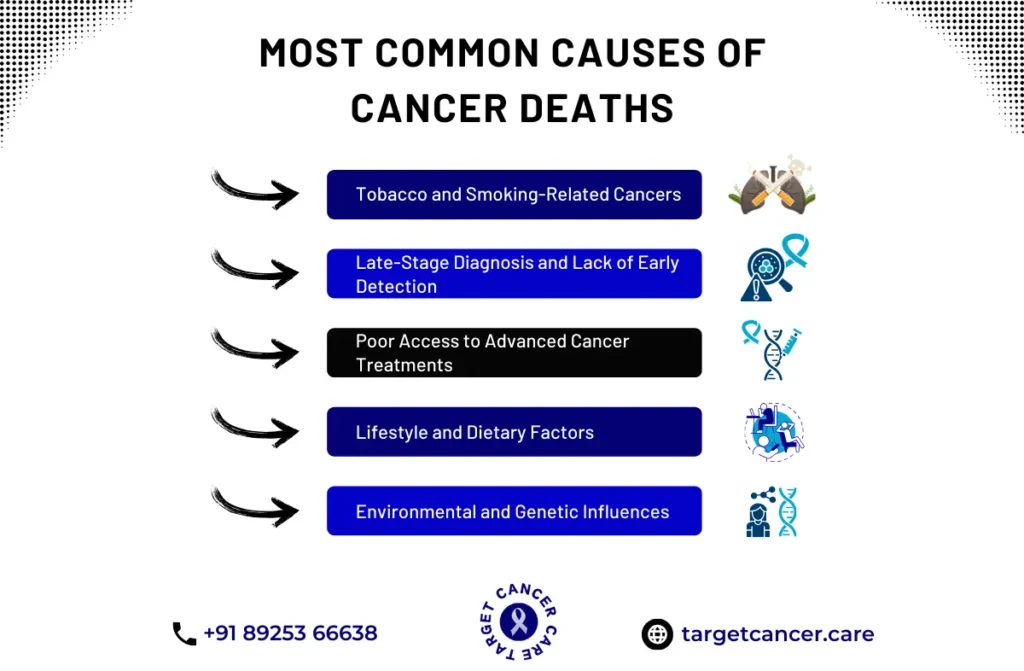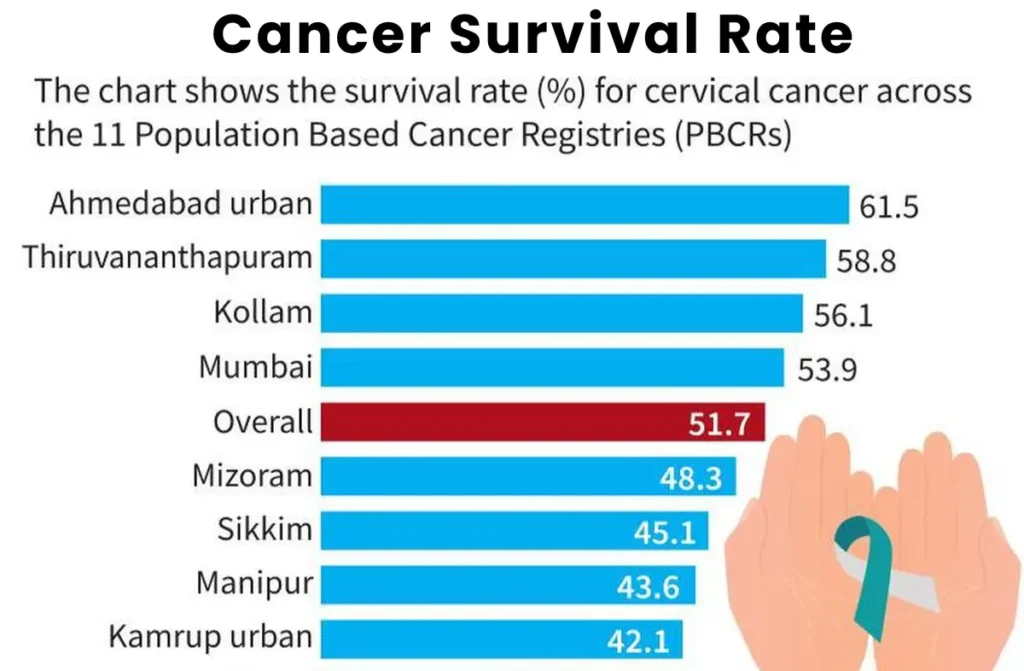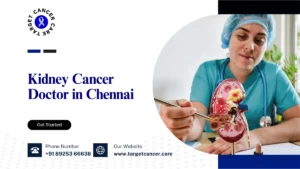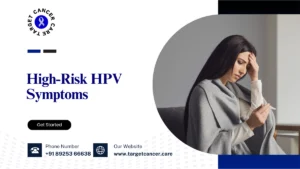The cancer death rate in India has seen a significant rise over the past few decades, becoming a critical health issue that affects millions of families. With over a million new cases diagnosed annually, the burden on the healthcare system is vast, and awareness about preventative measures is essential. But what’s driving this increase, and how can India improve its cancer survival rate in India? Let’s explore this topic with an understanding of both the challenges and the initiatives making a difference.
Overview of Cancer in India
Cancer rates in India continue to increase each year, with lung cancer, breast cancer, cervical, and stomach cancers among the most common. Given the vast population, the impact of cancer is felt across all age groups and demographics, affecting both rural and urban communities. Despite advancements in treatment and technology, the high cancer death rate in India remains a growing concern.
Rising Cancer Cases and Their Impact
In India, the incidence of cancer has been escalating due to factors such as pollution, unhealthy lifestyle habits, and limited access to preventive healthcare. As a result, the healthcare infrastructure faces intense pressure to handle new cases and provide care to existing patients, which contributes to high mortality rates. For the nation to reduce the cancer death rate in India, there is an urgent need to improve both awareness and access to quality care.

Why Cancer Death Rate in India is Increasing
The rising cancer death rate in India can be attributed to multiple factors. Limited awareness, lack of early diagnosis, and delayed treatment all play significant roles. When addressing what is the cancer rate in India, it’s evident that late-stage diagnoses are prevalent, reducing survival chances and escalating treatment costs, burdening families financially.
Major Factors Influencing Cancer Death Rates in India:
- Access to Healthcare and Diagnostics: A key factor in the cancer death rate in India is healthcare accessibility. Many rural areas lack basic healthcare facilities, leading to delays in diagnosis and treatment. Access to modern diagnostics is limited, and as a result, many patients discover their condition in later stages, which drastically impacts survival rates.
- Cancer Awareness and Education Levels: Cancer awareness is crucial in the fight against high mortality rates. Unfortunately, in India, cancer awareness is still low, especially in rural areas. This lack of awareness means that symptoms are often ignored until the disease progresses to an advanced stage. Educational campaigns could help change this situation by promoting the importance of regular checkups and early screenings.
- Socioeconomic Barriers in Cancer Care: Healthcare costs are a significant barrier to effective cancer treatment in India. Due to financial constraints, many individuals cannot afford the high cost of cancer treatment, which often includes surgery, chemotherapy, and radiation therapy. These financial difficulties are a substantial factor contributing to the cancer death rate in India.
Cancer Survival Rate in India
- Current Statistics on Survival Rates: Cancer survival rates in India vary significantly depending on the type of cancer and access to early diagnosis and treatment. What is the cancer rate in India? While survival rates for cancers like breast and cervical are improving with early detection, they still lag behind global standards due to late diagnoses and limited healthcare access.
- Comparing India’s Survival Rates with Global Numbers: When discussing what is the cancer rate in India, it’s important to note that survival rates are relatively low compared to global standards. High-income countries benefit from early detection programs and better healthcare access, resulting in higher survival outcomes. These differences emphasize the need for robust public health initiatives and infrastructure improvements in India.
Cancer Recovery Rate in India
- Recovery Trends and Progress: While the cancer death rate in India remains high, there have been positive trends in recovery rates, especially in cancers that are more responsive to early treatment. Improved medical technology and targeted therapies have led to better recovery outcomes for certain types of cancer, such as breast and cervical cancer.
- Initiatives Driving Recovery and Support Systems: Several initiatives, both government-led and community-based, are helping improve cancer recovery rate in India. Programs aimed at subsidizing cancer treatments, building more cancer hospitals, and supporting patients and families are making a tangible difference. Non-profits and local organizations are also stepping up to provide care and assistance to cancer patients.
Improving Cancer Survival Rates in India
Government and Non-Profit Interventions
The government of India, along with non-profit organizations, has introduced various programs to support early diagnosis and treatment. From awareness campaigns to free screening programs, these initiatives aim to bring down the cancer death rate in India.
Technological and Medical Advancements
The advancements in medical technology, such as improved imaging systems and genetic testing, are pivotal in increasing cancer survival rates. New diagnostic tools enable early detection, allowing for timely intervention. Despite these advancements, affordability remains a concern for many patients in India.
Awareness Programs and Community Outreach
Awareness programs are essential in educating the public about cancer prevention, early detection, and treatment options. Community outreach initiatives have proven effective in educating people, especially in rural areas, about regular screenings and lifestyle changes to prevent cancer.
Deaths in the Age Group Between 30-69 Years
Cancer is one of the leading causes of death among individuals aged 30-69 years. Several lifestyle, genetic, and environmental factors contribute to the rising number of cases in this age group. Early detection and timely medical intervention are crucial in reducing mortality rates.
Key Factors Contributing to Cancer Deaths (30-69 Years)
- Tobacco and Alcohol Use – Smoking and excessive alcohol consumption significantly increase the risk of cancer-related deaths.
- Unhealthy Diet and Obesity – Processed foods, high sugar intake, and obesity contribute to various cancers, including liver, colorectal, and breast cancer.
- Late Diagnosis – Many cases are detected at advanced stages, reducing the chances of successful treatment.
- Occupational Hazards – Exposure to harmful chemicals and radiation in workplaces increases cancer risks.
- Limited Access to Treatment – Inadequate healthcare infrastructure in certain areas affects survival rates.
- Cancer Death Rate in India – The mortality rate continues to rise due to late diagnosis and lack of awareness.
Reducing the cancer death rate in India requires better screening programs, improved healthcare access, and lifestyle changes. Encouraging early screenings, promoting healthy habits, and increasing awareness can significantly lower mortality rates in this vulnerable age group.

Role of Early Detection and Prevention
Early detection and prevention play a vital role in maintaining good health and reducing the risk of serious diseases. By identifying health issues in their initial stages, individuals have a better chance of receiving timely and effective treatment. Regular health check-ups, screenings, and monitoring of symptoms help in catching diseases like cancer, diabetes, and heart conditions early, making them easier to manage or cure.
Prevention, on the other hand, focuses on reducing the likelihood of diseases through healthy lifestyle choices. This includes maintaining a balanced diet, exercising regularly, managing stress, and avoiding harmful habits like smoking or excessive alcohol consumption. Vaccinations and preventive medications also contribute significantly to lowering the risk of certain infections and chronic illnesses.
When individuals prioritize early detection and prevention, they can avoid severe complications, reduce healthcare expenses, and improve their overall quality of life. Moreover, public health initiatives promoting awareness about regular screenings and preventive measures encourage people to be proactive about their well-being.
Ultimately, early detection and prevention are key strategies in promoting long-term health and reducing the burden of chronic diseases on individuals and healthcare systems.
The Importance of Early Detection and Diagnosis
Early detection is a critical factor in improving cancer outcomes. Identifying cancer in its initial stages significantly enhances the effectiveness of treatments, reducing the overall cancer death rate in India. Unfortunately, late-stage detection remains a challenge, contributing to the high mortality associated with cancer. Efforts to educate the population on recognizing early symptoms and undergoing routine screenings can play a vital role in reversing this trend.
Common Screening Techniques
- Mammograms: Essential for detecting breast cancer early, especially for women over 40.
- Pap Smear Tests: Vital for identifying cervical cancer in women.
- Colonoscopy: Used to detect colorectal cancer in individuals over 50 or those with risk factors.
- Low-Dose CT Scans: Recommended for individuals at high risk for lung cancer, particularly smokers.
Promoting widespread access to these screening tools will not only lower the cancer death rate in India but also foster better public health outcomes.
Types of Cancer
Cancer is not a singular disease but a collection of diseases that vary in type and progression. Understanding these differences is crucial for effective management:
- Carcinomas: Affect epithelial tissues, such as breast, lung, or prostate cancer.
- Sarcomas: Originate in bones, muscles, or connective tissues.
- Leukemia: Involves the blood and bone marrow.
- Lymphomas: Affect the lymphatic system.
- Melanomas: Impact the skin or eyes.
Stages of Cancer
Cancer progresses in different stages, determining its severity and treatment approach. Understanding these stages helps doctors choose the right treatment plan and predict the Cancer Recovery Rate in India.
Stages of Cancer:
- Stage 0: Abnormal cells are present but have not spread. This stage is also called carcinoma in situ.
- Stage I: Cancer is small and localized, meaning it has not spread to nearby tissues.
- Stage II: The tumor is larger or has started spreading to nearby lymph nodes.
- Stage III: Cancer has spread further into nearby tissues and lymph nodes.
- Stage IV: The most advanced stage, where cancer has spread (metastasized) to distant organs.
Key Points:
- Early-stage cancers (Stages 0–I) have a high survival rate.
- Stage II and III require aggressive treatment, such as surgery, radiation, or chemotherapy.
- Stage IV is challenging to treat, but targeted therapy and immunotherapy can improve survival.
- The Cancer Recovery Rate in India varies based on cancer type, stage, and available treatments.
Early detection and timely treatment play a crucial role in improving survival and recovery rates.
Survivorship and Supportive Care
Embracing Life After Cancer
Survivorship care focuses on improving the quality of life for individuals who have undergone cancer treatment. With advancements in medical technology and personalized therapies, there is a growing emphasis on improving cancer survival rates in the country.
Supportive Care for Patients and Families
Supportive care extends beyond physical health, addressing emotional, psychological, and social challenges faced by cancer survivors. Essential aspects include:
- Nutritional Guidance: Tailored diets to rebuild strength and maintain health post-treatment.
- Mental Health Support: Counseling services to combat anxiety, depression, and fear of recurrence.
- Physical Rehabilitation: Programs to regain mobility and physical strength.
- Community Support: Peer groups and networks offering emotional and practical assistance.
Treatment Approaches: Tailoring to Cancer Behaviour
Improving the Cancer Survival Rate in India requires treatments tailored to the unique characteristics of each cancer type and stage. Personalized approaches help maximize success while minimizing side effects.
Common Treatment Approaches:
- Surgery: Effective for localized cancers, especially in early stages.
- Radiation Therapy: Targets specific areas, reducing cancer cells.
- Chemotherapy: Addresses cancers that have spread.
- Immunotherapy: Enhances the immune system’s ability to fight cancer.
- Targeted Therapy: Focuses on specific cancer cell changes.
Such advancements significantly contribute to the success rate of cancer treatment in India, giving patients better chances of recovery and quality of life.
Factors Contributing to the Low Survival Rate of Breast Cancer in India
The Cancer Survival Rate in India, particularly for breast cancer, remains a challenge due to several key factors. Despite advancements in treatments, barriers such as lack of awareness, late diagnosis, and socio-economic hurdles continue to impact outcomes.
- Late Diagnosis: Over 60% of breast cancer cases in India are detected at advanced stages.
- Limited Awareness: Many women are unaware of self-examinations or early warning signs.
- Healthcare Accessibility: Rural and underserved areas lack access to advanced diagnostic tools and treatments.
- Social Stigma: Fear and misconceptions delay seeking timely medical help.
Improving education, early screenings, and affordable care is vital to enhancing the Cancer Survival Rate in India.
Reasons Why the Survival Rate of Breast Cancer Is Low in India
The Cancer Survival Rate in India, particularly for breast cancer, is impacted by several socio-economic and medical challenges. Despite advances in treatments, survival rates remain low due to the following reasons:
- Delayed Diagnosis: Most cases are detected in advanced stages.
- Limited Access: Rural areas lack adequate healthcare infrastructure.
- High Costs: Many families cannot afford advanced treatments.
- Social Stigma: Fear and misconceptions prevent early medical help.
- Lack of Awareness: Insufficient knowledge about self-exams and symptoms.
Improving education, access to affordable care, and reducing stigma are vital to enhancing the success rate of cancer treatment in India.
Conclusion
The cancer death rate in India remains a pressing issue, but strides are being made to reduce mortality and improve survival rates. By increasing awareness, enhancing healthcare access, and investing in early detection, India can continue to make progress in its fight against cancer. If you or a loved one is looking for more information or assistance, please reach out to healthcare professionals or consider supporting cancer awareness initiatives.




